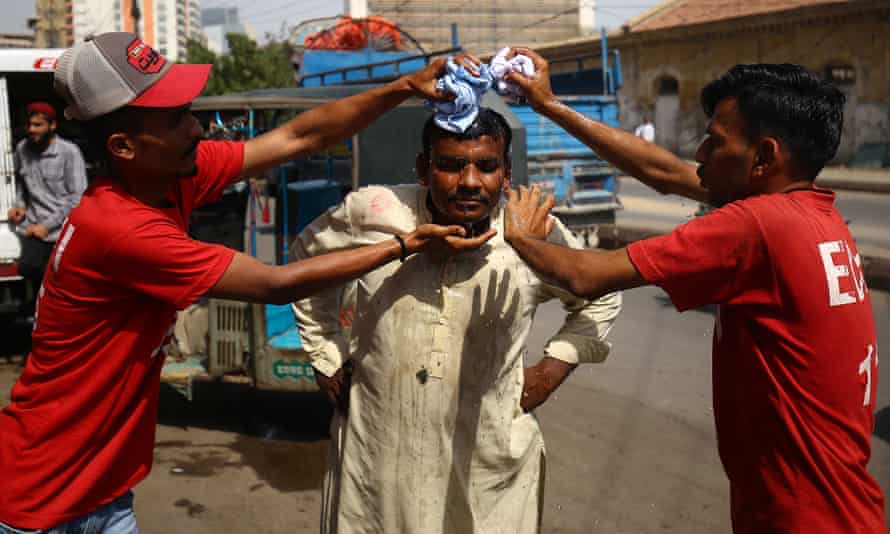In Karachi, hot weather is normal … but 44C feels like you’re going to die
As a doctor in a big city hospital I am part of a privileged class with air con and water. But millions have neither

Karachi’s heat hits you like a wall when you wake up in the morning. When you are up and getting changed, and the humidity hits you in the chest, you realise it’s going to be really hot today. But it’s another day, so you grab your bag and go to work.
I’m done with Karachi. I don’t want to live here any more. It’s the heat, the infrastructure, everything. You’re sweaty, you have problems breathing, there’s dust in the air. You have to use your brain at work but you have brain fog, and after 25 minutes you already need to step out for air. But when you do it’s hot, sunny, humid.
It’s happened to me a bunch of times that I come home after work and I feel like my body’s not working like it’s supposed to. I can’t work out, I can’t go out, I can’t go for a walk. I feel nauseous. When it’s above 44C it feels like you’re going to die – I’m not making that up.
And it’s getting worse. Now it goes above 40C on an average day, and the intensity of the heat is different to when I was growing up in the city; the sunlight’s brighter, more piercing. Karachi always had a sea breeze but now the air is really still during the day. Our houses are not made to withstand this kind of heat. A couple of days ago, I took out some food but then had a meeting and by the time I came back it had gone bad.
The thing that’s worrisome for me is that we’re experiencing the heatwaves earlier than we’re supposed to. We know in Karachi that we’re supposed to see heat from the end of June through to September, but now it’s like a five-month haul of heat instead. More and more, we’re seeing heatwave camps – shelters put up in shaded areas with fans, water and health checks.
The electricity problems make it worse. The load-shedding comes during summer months and, these days, often falls in Ramadan, when people can’t drink water.
And the tariffs have increased so my electricity bill for the last month was 72,000 [Pakistani] rupees [GBP330]. That is an astronomical amount, like 65% of my salary on the electricity bill for the two ACs and a fridge – the basic utilities. Our electricity outage was 92 hours last month and my area isn’t one that suffers regular cuts.
But the real question is not how am I doing. I am doing OK because I have a house that is cool because of air conditioning, and I have water because I can afford to pay 4,500 rupees for a tank. My question is: when the electricity goes during the middle of the heat, what the hell are the people doing on the other side of the city who don’t have any of this?
There’s a huge disparity. I belong to a very privileged class where I can complain. I have a forum to complain that our infrastructure, our weather, everything sucks. There are people out there, this is their existence – they don’t have electricity for hours, maybe 12 hours, and they don’t have generators.
I see some of the effects in the hospital, symptoms of heatstrokes because they’re in the direct heat. In the previous hospital I worked at, a lot of people used to come to the hospital because it had an uninterrupted power supply. There was nothing seriously wrong with them but they’d come and be admitted when they had gone a long time without electricity – they’d get meals and a bed.
I feel their helplessness when I’m talking to them. Their hygiene levels are affected, their way of talking, their behaviour is affected. But many accept that this is what life is going to be for them.
As told to Kaamil Ahmed